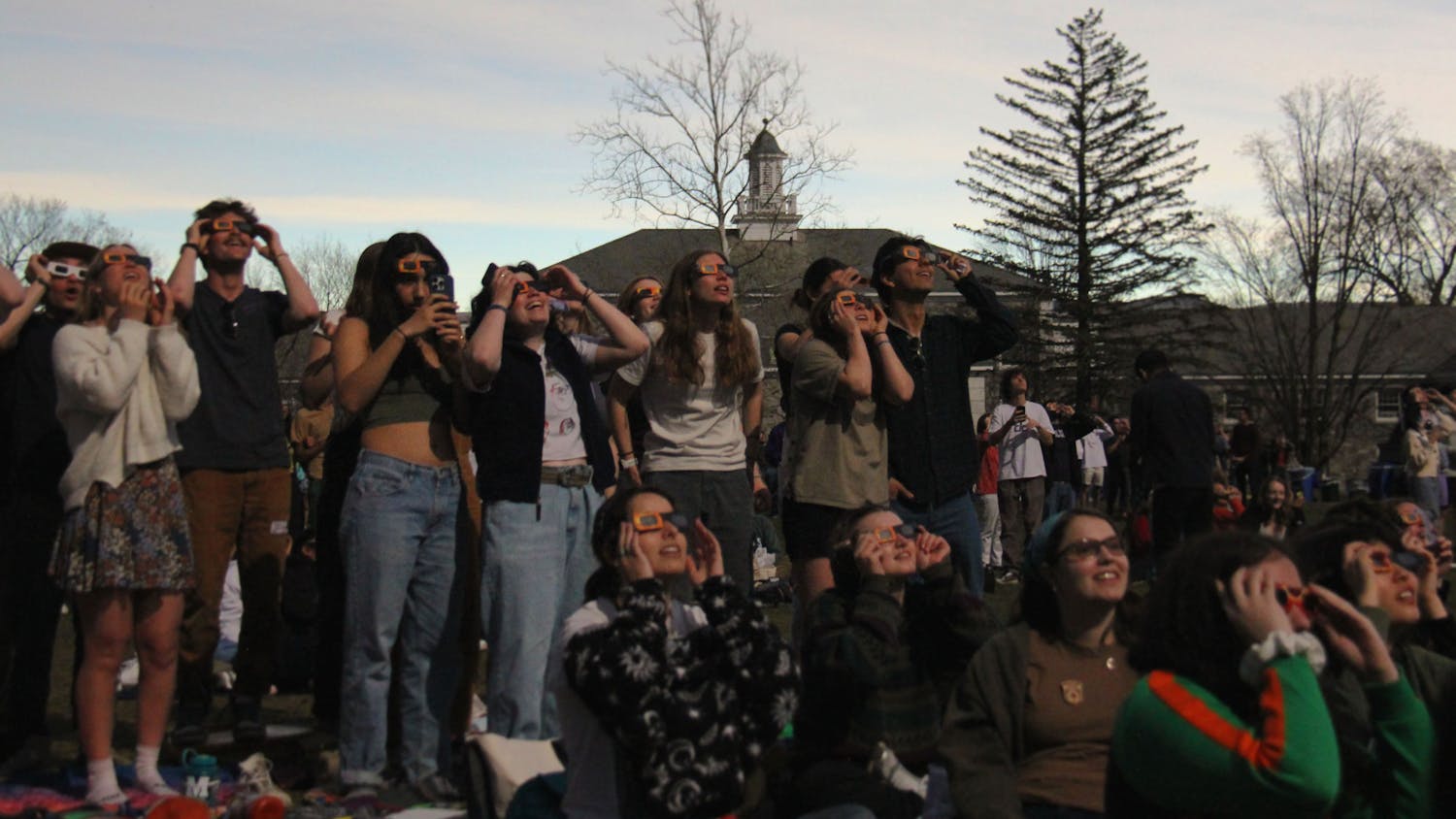Middlebury featured a photo of a student protesting Charles Murray’s 2017 campus visit in a promotional Instagram story last week, sparking anger among current and former students who accused the college of attempting to rewrite a painful chapter of its history for marketing purposes.
The Instagram story was posted Wednesday as part of the college’s “Midd Daily” campaign, which aims to give prospective students a taste of campus life. It featured a photo of Austin Kahn ’17.5, originally taken by Michael O’Hara ’17 on assignment for The Campus, protesting Murray’s visit in Wilson Hall. In the photo, Kahn holds a sign reading “this is an appropriate response” in front of the livestream of Murray’s conversation with Political Science Professor Allison Stanger. The Instagram story bore a caption that read, in part, “Social Justice and Activism: At Middlebury, we don’t just talk about social justice; we also act on it.” It was deleted later that afternoon.
In the hour before O’Hara took the photo on March 2, 2017, protesters shouted down Murray as he attempted to deliver his talk in Wilson Hall, forcing him and Stanger to livestream their conversation from a different room. Stanger was later severely injured by protesters while leaving the building.
Kahn was one of 74 students sanctioned by the college that spring for his role in the Murray protests (he did not reply to requests to describe the extent of sanctions he received as of press time, but has written publicly about being sanctioned on social media in the past). Severity of sanctions ranged from probation, which stayed on students’ records until the end of the semester, to official college discipline, which would remain on students’ permanent records.
If it intended to embrace a longstanding part of campus culture, the Instagram story of Kahn also prompted anger that Middlebury was using an event for which students were disciplined as part of an advertising campaign.
“Funny that you would punish students for protesting and then use their protest as part of an [sic] big advertising ploy,” wrote Cora Kircher ’20, a member of the environmental activism group Divest Middlebury, in an Instagram story of her own on Wednesday. Divest Middlebury later shared a screenshot of Kircher’s story to its Facebook page.
The Campus previously reported on the lengthy disciplinary process Murray protesters faced, which in part used photo and video evidence of the protests to pinpoint who was involved. That process garnered criticism from people on many sides of the free speech debate, with Murray lambasting the punishments meted out as "pathetically” insufficient while others decried the “terroristic” effects of a disciplinary process meant to “satisfy national audiences,” in the words of a professor.
“The funny thing is that after these protests, Middlebury launched an investigation where they used images like the one neatly featured on their account to discipline dissidents among the student body and intimidate sympathetic faculty,” Kahn wrote on his own Facebook page Thursday in a post that has since been shared 26 times.
In an email to The Campus, Social Media Director Andrew Cassel acknowledged criticisms of the Instagram story as “fully justified.”
“When we realized our mistake, of course we were concerned about any hurt it would bring to our community,” Cassel wrote. “In this case, both the admissions and communications teams recognized that we had made this oversight, and deleted the post.”
Kahn said he saw the promotional intent behind the posting of the photo as stripping away the “socio-political context” of the protest it captured. “The phenomenon of removing that meaningful act from its context totally perverted it and makes it meaningless,” he said. “It’s absurd.”
In what he saw as a silver lining, Kahn received a “wave” of messages from friends, many of whom had gone through the disciplinary process with him, notifying him that the image had been used in the college’s story on Wednesday.
O’Hara, the photographer, said that the Office of Admissions previously asked him permission to use the image, which he granted, but that he “was not provided context for how the photo might be used.” He granted permission under the assumption that the image would be included in #SixtyScenes, a collection of photos documenting campus life separate from the “Daily Midd” series that are shared as Instagram posts, not stories.
Cassel, who began as the college’s social media director last December, previously told The Campus that photos featured in the “Midd Daily” series are chosen collectively by multiple members of the admissions and communications offices. Midd Daily and #SixtyScenes fit Cassel’s vision of giving the college a more personal social media presence that better captures day-to-day realities of campus life, goals he described in a recent Campus profile.
Debate over Charles Murray’s work and his right to a platform at Middlebury had revived at the college in the months prior to Kahn’s surprise shoutout: Murray was scheduled to speak in Wilson Hall on March 31 on a new invitation from the College Republicans. But Covid-19 led to the cancellation of his visit, which would have been his third to Middlebury since 2007, along with the rest of in-person spring programming.
College Instagram campaign features sanctioned student protester, reviving Murray tensions

Comments



